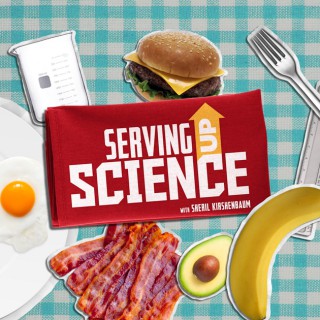Serving Up Science
Follow Serving Up ScienceThe series all about food: where it comes from and how it impacts our health and our planet. History buff, foodie and science writer Sheril Kirshenbaum serves up a side of science and history, explores the reasons behind the recipe, and offers some tasty tips on your favorite foods. WKAR host Karel…
- Dec 11, 2019 LATEST EPISODE
- infrequent NEW EPISODES
- 9m AVG DURATION
- 20 EPISODES
Latest episodes from Serving Up Science

The Dangers Of Stress Eating And How To Fight The Urge | Serving Up Science
Whenever you’re stressed at work or school, do you ever catch yourself reaching for a bag of chips or candy? Or are you ever so lost in your work that you don’t realize you’re snacking? On this episode of Serving Up Science, science writer Sheril Kirshenbaum and WKAR’s Karel Vega discuss stress eating with student reporter Amanda Barberena.

Candy, scary movies and costumes all signify that Halloween is approaching, but one important characteristic is missing: jack-o’-lanterns. On this episode of Serving Up Science, science writer Sheril Kirshenbaum and WKAR’s Karel Vega discuss the dawn of the jack-o’-lantern with the help of student reporter Amanda Barberena.

When you go to the store and pick up a gallon of milk, you're probably not worried about it being filled with formaldehyde, thanks to the FDA. However, it took some brave men to risk their health to bring food safety issues to light. On this episode of Serving Up Science, science writer Sheril Kirshenbaum and WKAR’s Karel Vega talk about the heroic act of the Poison Squad.

What Happens When The Media Beefs With The Food Industry? | Serving Up Science
A few words were spoken and suddenly food prices plummeted. On this episode of Serving Up Science, science writer Sheril Kirshenbaum and WKAR's Karel Vega talk about the three most famous food libel cases of all time.

Energy is inherently related to every significant challenge of the 21st century: water scarcity, inequality, national security and agriculture. On this episode of Serving Up Science, Sheril Kirshenbaum speaks with Dr. Michael Webber, the Chief Science and Technology Officer at the global energy and infrastructure services company ENGIE.

Water is critically important to agriculture as well as many aspects of our lives. On this week's segment Sheril and Karel speak with Dr. Jay Famiglietti, director of the Global Institute for Water Security at the University of Saskatchewan in Saskatoon, Canada about the future of water.

The Science Behind Brain Freeze (And How You Might Stop It) | Serving Up Science
In the summertime, there’s really no better way to cool off than with a nice big ice cream cone. Imagine a time when you’ve taken a bite out of your cone when suddenly, you feel a strange sensation in your head. The sensation commonly known as brain freeze.

Organic? Free-Range? Cage-Free? When It Comes To Eggs, Which Should You Buy? | Serving Up Science
When it’s time to pick up eggs at the supermarket, making a choice can be overwhelming. Should you be buying cage-free or free range? Organic or conventional? What is the difference between all of the terms you see on the carton?

Every chef has their own technique when it comes to cooking, roasting, broiling or grilling for the best flavor, but most agree on one important step – meat should rest after cooking and before slicing.

WKAR's podcast "Serving Up Science" taught dozens of people about the science behind taste. It was the final signature event of Michigan State University's seventh annual Science Festival.

Are you a supertaster? You can find out at Serving Up Science's live show this weekend. Sheril and Karel will be at the Kellogg Center on Saturday, April 20 as the last show during the Michigan State University Science Festival this year.

Most people know the four main senses of taste: sweet, sour, bitter, and salty. But there’s also a fifth sense, which is more complex. Umami.

On this week's episode of Serving Up Science, science writer Sheril Kirshenbaum and WKAR's Karel Vega discuss the repercussions of swill milk during the 1850's.

On this episode of Serving Up Science, science writer Sheril Kirshenbaum and WKAR's Karel Vega discuss the impact of eating red meat on the human diet and the environment, in relation to the EAT-Lancet Commission report.

Finding information online is easy, but finding the correct information is a bit harder. On this episode of Serving Up Science, science writer Sheril Kirshenbaum and WKAR's Karel Vega talk about reputable sources, especially in regards to the recent E. Coli outbreak in romaine lettuce.

Are GMOs safe? What is the deal with organic food? On this week's episode of Serving Up Science, Science Writer Sheril Kirshenbaum and WKAR's Karel Vega interview Academy Award-Nominated Director Scott Hamilton Kennedy about his documentary Food Evolution .

New Year, New You? Why Many Experts Are Recommending The Mediterranean Diet in 2019
Trying to eat healthy this year, but not sure where to start? On this episode of Serving Up Science, science writer Sheril Kirshenbaum and WKAR’s Karel Vega take a look at the Mediterranean diet.

On this episode of Serving Up Science, science writer Sheril Kirshenbaum and WKAR's Karel Vega discuss how useful and environmentally friendly meal kits are.

A turkey trot isn't just a run for families. On this episode of Serving Up Science, science writer Sheril Kirshenbaum and WKAR's Karel Vega discuss the history of turkeys for Thanksgiving dinner.

On this edition of Current State - A Serving Up Science takeover: The MSU Fall 2018 Food Literacy and Engagement Poll shows what Americans understand and are concerned about regarding their food; Low carb diets seem like a good idea on the surface, but all nutrients are necessary in moderation; You may soon be faced with another decision when buying meat at the grocery store: farm-raised vs laboratory-grown.








